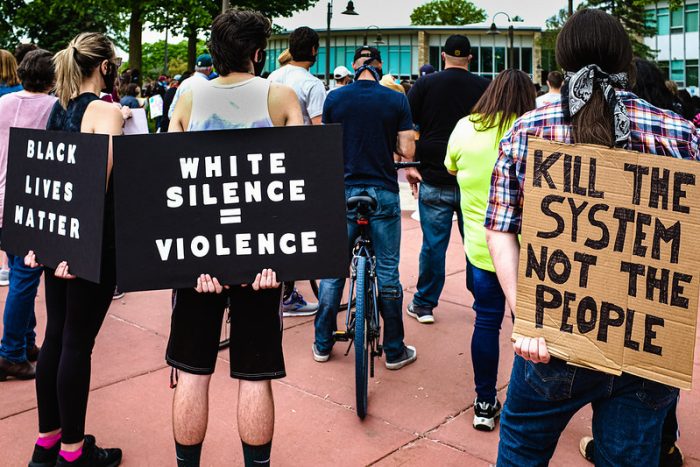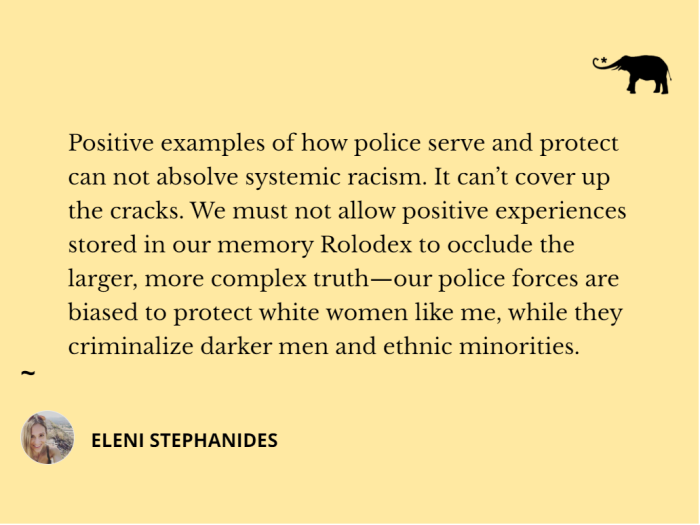In the back closet of a San Diego 7-Eleven, my voice shook as I recounted my story to the officer.
“Twenty minutes earlier, I’d been walking back to my car after dinner in North Park when a thief came at me from behind. Armed with a black handgun, he demanded that I hand over my bag.” Afterward, I scrambled to a nearby convenience store asking to use the phone. Five minutes later, the police arrived.
When asked how I was feeling, I admitted to harboring some shame. Maybe I should have parked closer to the restaurant so that I wouldn’t have had to walk down so many dark streets at night to get back to my car. Maybe this could have been avoided.
The officer, a Latinx man in his mid-to-late 40s, leaned in slightly toward me. He could have responded with, “Yeah, you should be more careful next time,” but he graced me with the following kindness instead: “Listen to me. It is not your fault that there are bad people out there. You are not to blame for this happening.”
As they drove me to the crime scene to reenact what happened, I took in their power osmotically. I noted how pedestrians—particularly people of color—straightened their postures when we drove by. Some stopped what they were doing entirely, seemingly putting on their best behavior. Sitting in the backseat of their cruiser, I felt protected.
That evening, I returned to my Airbnb appreciating the police. Gratitude filled me. After a truly shocking experience, they had taken care of me.
Years later, they served me again. I was working as a Lyft driver, transporting a carload of happily-intoxicated seniors in a California town known for its wineries and quaint restaurants. I’d taken five of them, but only had four seatbelts, so when a cop pulled me over, I assumed a ticket was inevitable. Instead, he broke into a smile as he witnessed the comical situation in my car—five chipperly inebriated seniors packed into my backseat like jovial chipmunks.
“Reliving your youth?” he joked, before offering to drive two of them while I transported the remaining three. Not only did I not receive a fine, but for the most part, the cop treated me with kindness and respect.
Fast forward to a few months later. A police officer pulled me over during a Lyft ride down the tree-lined streets of midtown Sacramento. Greeting me with a smile after I rolled my window down, he asked in a cheerful voice: “Did you know your tail light’s out?”
He didn’t launch a million questions or demand to search my car. He pretty much immediately disclosed his reason for pulling me over, waving to my passengers in the backseat as he did so. “I’m gonna write you a fix-it ticket,” the cop announced at the end of our interaction. After he handed it to me: “Try to get that fixed as soon as possible. Good night, be safe out there.”
~
In the days following the George Floyd tragedy, I looked back on my encounters with police, wondering whether they would have treated me with the same kindness if I were a Black man or a Latinx woman. I thought of this passage from Leslie Jamison’s, The Recovering:
“The abstraction of privilege is ultimately a question of what type of story gets told about your body: Do you need to be shielded from harm, or prevented from causing it? My body has been understood as something to be protected, rather than something to be protected from.”
My experiences showed that policemen are capable of gentleness and concern. Why then, I wondered, can’t they collectively extend similar treatment to everyone—particularly Black men—who deserve the same?
People of color recount far more negative encounters with police—treatment ranging from implied rudeness to violent aggression. Even though Black people make up only nine percent of the city’s population, 28 percent of all people stopped by Los Angeles police during the second half of 2018 were Black. They’re also more likely to have firearms pointed at them, be detained, searched, and handcuffed—even though statistically speaking, more white people are found to have drugs and weapons on them (in proportion to the number stopped), according to a 2019 article in The Guardian.
A 2019 Pew Research study found that:
“Nearly two-thirds of Black adults say they’ve been in situations where people acted as if they were suspicious of them because of their race or ethnicity, while only a quarter of white adults say that’s happened to them. Roughly a third of both Asian and Hispanic adults (34% and 37%, respectively) say they’ve been in such situations.”
This pattern of treatment has led some people of color to fear even calling the police. Black author, Patrisse Cullors described her family’s dealings with police in her memoir, When They Call You a Terrorist. Her brother, who struggled with mental illness, was treated like an animal by the police. After a while, her family stopped reaching out to law enforcement—taking matters into their own hands when her brother’s mental illness spun out of control. “If we are to survive, this is what our future must look like,” she writes.
~
As Colleen Walsh wrote in an article in The Harvard Gazette (quoting Sandra Susan Smith),
“Despite what many people in low-income communities of color think about police officers, the broader society has a lot of respect for police and thinks if you just get rid of the bad apples, everything will be fine. The problem, of course, is this is not just an issue of bad apples.”
Punishing one policeman won’t address the issue—individually or systemically. Punishment won’t change beliefs formed over years of conscious and unconscious learning. Nor will it reset the beliefs of thousands of other officers who unconsciously misuse their power with Blacks.
Am I grateful to the policemen who helped me? Very. I won’t forget their kindness—particularly the ones who supported me post robbery. Did my experiences delude me into believing our police forces have the best interests of all our citizens in mind? I can’t say they did. How could they, if internalized racism still plagues our country and all our institutions?
Positive examples of how police serve and protect cannot absolve systemic racism. It can’t cover up the cracks. We must not allow positive experiences stored in our memory Rolodex to occlude the larger, more complex truth—our police forces are biased to protect white women like me, while they criminalize darker men and ethnic minorities.
As white people, we should see this disparity as more reason to advocate for an end to systemic bias. It’s incumbent upon us to demand that this treatment be afforded to every human in our society, regardless of their gender, skin color, or socioeconomic class.
~












Read 25 comments and reply